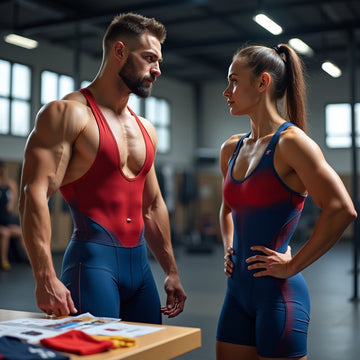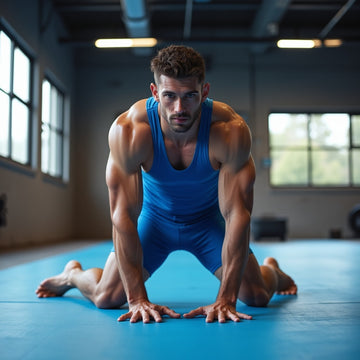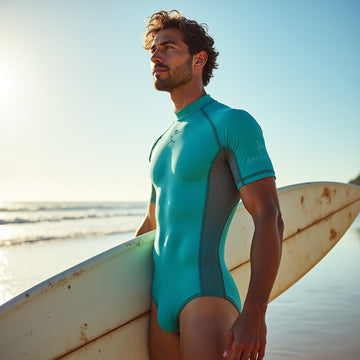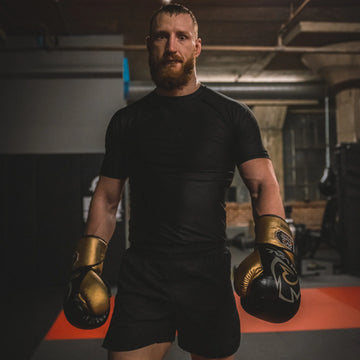A wrestling singlet is a one-piece, tight-fitting garment designed to boost grip, mobility, and muscle support on the mat. It blends compression, lightweight fabrics, and precision tailoring for unmatched performance during matches and training.
Understanding Wrestling Singlet Types
Wrestling singlets vary by style, cut, and regulation. You’ve got three main categories: freestyle, folkstyle (also called scholastic), and Greco-Roman. Each feels slightly different and meets specific rules, so knowing which one matches your discipline is crucial.
Freestyle singlets usually sport a higher cut on the legs, offering wider movement for dynamic takedowns. Folkstyle gear often cuts tighter under the arms, prioritizing security during mat wrestling. Greco-Roman singlets can mirror either shape, but they often feature reinforced straps to withstand upper-body clinches.
Regulatory bodies like United World Wrestling (UWW) and NCAA have tight specs on strap width, leg opening, and logo placement. If you plan to compete, double-check those guidelines—missing a detail can cost you a point before the whistle even blows.
Key Materials and Fabrics
Fabrics make or break how a singlet feels and performs. Most singlets blend polyester for moisture-wicking, spandex (also known as elastane) for stretch, and sometimes nylon for durability. Here’s a closer look at those three:
| Fabric | Weight | Stretch | Durability |
|---|---|---|---|
| Polyester | Light | Moderate | High |
| Nylon | Medium | Low | Very High |
| Spandex | Ultra-light | Excellent | Good |
Most top-tier singlets sit around 80–90% polyester and 10–20% spandex. That ratio hits a sweet spot: it keeps you dry by wicking sweat, yet it clings where it should—around shoulders, chest, and thighs—without cutting off circulation.
Some brands layer a denser weave on high-friction areas like the inner thighs. Others add mesh panels under the arms or behind the knees for better airflow. Look closely at fabric specs—textured weaves often hold prints and logos more crisply.
Fit and Sizing Essentials
A perfect wrestling singlet feels like a second skin. Too loose, and you risk slipping fabric; too tight, and breathing or bending gets awkward. Here’s what to look at:
- Height vs. weight guidelines: Brands differ, so always check their chart (see our wrestling singlet sizing chart) rather than guessing based on another label.
- Chest measurement: Wrap the tape across the broadest part; a snug fit secures the upper body.
- Thigh circumference: Measure around the thickest part—gives insight into leg opening comfort.
- Torso length: From shoulder top to crotch, this helps avoid an overly baggy groin or lifted hem.
Keep in mind that washing can shrink spandex blends by 2–3%. If you’re on the upper edge of a size chart, consider sizing up or looking for a “stretch fit” variant.
For youth and girls, minor adjustments in strap placement and chest panel shape can make a big difference. Many manufacturers now offer gender-specific cuts to address those nuances.
Performance Benefits of Compression
Compression refers to how a singlet gently squeezes muscles. It’s not a tightness that restricts; it’s the feeling that your body is locked in. That snugness helps in several ways:
First, it supports muscle fibers, reducing vibration during explosive moves. Second, it can aid blood flow, which helps you recover faster between takedowns. Lastly, a firm hold means less fabric bunching—and fewer distractions when you’re going full speed.
- Pros: Enhanced proprioception, reduced muscle sway, quicker blood circulation, sleek appearance.
- Cons: Can feel slightly restrictive until broken in, may overheat if fabric isn’t breathable.
Durability and Care Tips
To keep a singlet in fighting shape, a solid routine is a must (check our wrestling singlet care instructions). Wrestlers often skip this part, only to find seams splitting before a big meet. Avoid that headache with a few straightforward tips:
- Machine-wash cold on gentle cycle; heat damages spandex fibers.
- Use mild detergent—harsh chemicals break down elasticity.
- Air-dry flat or hang by straps; dryer heat can warp shape.
- Spot-treat stains immediately—don’t let chalk or body oils set.
- Inspect seams and hems weekly; a small repair now beats a major tear later.
For long-term storage, slip your singlet into a breathable bag. Avoid plastic, which can trap moisture and invite mildew. If you train multiple times a week, consider rotating two or three singlets so each one gets proper downtime.
Design, Color, and Branding
Designs range from sleek solids to full-bleed graphics. Bold patterns can intimidate opponents or show team pride, but they also require precise printing methods. Sublimated prints—where dye fuses with fabric fibers—won’t crack or peel over time.
Color choice isn’t just about flair. Dark shades can look trim and hide sweat marks; lighter colors reflect heat better on hot mats. Some teams fade uniforms in the sun intentionally for that classic, well-worn vibe.
Brand logos and custom team patches have to follow competition rules. NCAA rules limit logo size to 2 square inches, while UWW might allow up to 4. Always verify before you order custom singlets.
Budget vs Premium Singlets
When you’re deciding between a value-priced singlet and a top-shelf model, you’re often weighing cost against longevity and comfort. Entry-level singlets can run $25–$40. Premium pieces hover around $80–$120.
Budget models typically use a simpler polyester blend with standard stitching. They’re fine for practice and casual competition. But at the elite level, those little features—like bonded seams, reinforced panels, and higher-elastane ratios—add up.
Before you decide, consider how often you compete or drill. If you wrestle four days a week and travel to tournaments, a premium singlet pays off in durability and performance. For a weekend warrior or newcomer, the budget line might suit just fine.
Top Picks for 2025
After testing dozens of singlets over varied training cycles and match conditions, these six rose to the top:
- Against All Gods Wrestling Singlet – Nightmarish graphics, superb compression fit, and reinforced straps.
- Angel of Death Wrestling Singlet – Ultra-light fabric, sublimated art, and moisture-wicking mesh zones.
- Archangel Michael Wrestling Singlet – Built-in chest panel support, anti-odor treatment, and bold colorways.
- Baphomet Seal Wrestling Singlet – Heavy-duty nylon blend, high-stretch spandex leg openings, and seamless side panels.
- Black Rose Madonna Wrestling Singlet – Soft-touch fabric, minimalist branding, and tailored torso length.
- Blessed Saint Wrestling Singlet – Dual-layered front, ergonomic seams, and vibrant sublimation.
If you’re wondering where to buy wrestling singlets, check our complete guide on where to buy wrestling singlets with reliable shipping and customer service. You can also browse BattleFit Gear’s full lineup of singlets, shorts, and accessories.
Choosing the right wrestling singlet boils down to knowing your style, fitting it correctly, and caring for it properly. With the 2025 picks here, you’ve got solid options no matter your budget or competition level.
Ready to upgrade your mat game? Browse these options and find the one that feels like a second skin—because the right singlet isn’t just clothing, it’s your edge on the mat.
Updated: 08-18-2025










